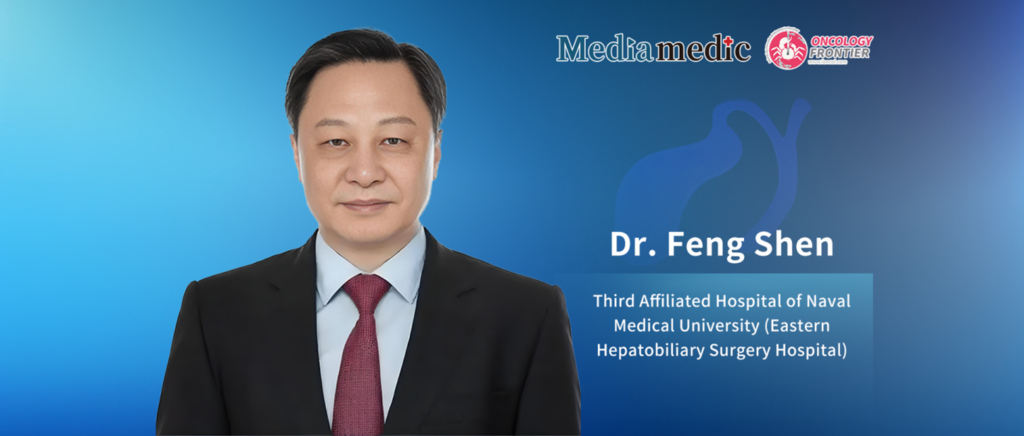
Editor’s Note: From October 24 to 27, 2024, the 9th Academic Symposium of the Chinese Division of the International Hepato-Pancreato-Biliary Association (IHPBA) was held in Wuhan. Experts discussed pressing issues and innovations in hepatobiliary and pancreatic surgery, exchanging diagnostic and treatment experiences, promoting new ideas and techniques, and advancing the management of hepatobiliary diseases in China. During the conference, a new professional organization, the Liver Tumor Committee of the IHPBA Chinese Division, was formally established, with Dr. Feng Shen from the Third Affiliated Hospital of Naval Medical University (Eastern Hepatobiliary Surgery Hospital) appointed as the committee’s director. Oncology Frontier invited Dr. Feng Shen for an in-depth interview, where he highlighted the committee’s commitment to uniting research efforts, fostering interdisciplinary collaboration, and addressing the many challenges posed by liver cancer. Among these challenges, advancing multidisciplinary treatment (MDT) capabilities, particularly for complex diseases like intrahepatic cholangiocarcinoma (ICC), is paramount. Looking forward, the committee aims to broaden collaboration, foster research breakthroughs, and develop precise and effective treatment strategies, creating a robust defense line in liver cancer prevention and treatment.Establishing the Liver Tumor Committee: Forging a New Chapter in Liver Cancer Prevention and Treatment
Dr. Feng Shen: At this year’s conference of the Chinese Division of the International Hepato-Pancreato-Biliary Association (IHPBA), the Liver Tumor Committee was officially inaugurated. This committee’s establishment was realized through the steadfast advocacy and guidance of Academician Chen Xiaoping, embodying our firm commitment to combating liver tumors, particularly liver cancer, which is highly prevalent in China.
As a significant health threat, liver cancer research and treatment continue to face substantial challenges. The committee’s purpose is to gather and strengthen research capabilities, foster deep interdisciplinary integration and collaboration, and tackle the complexities of liver cancer head-on. This mission aligns with the academic role we uphold as an organization and reflects the founding spirit of the committee.
Multidisciplinary collaboration (MDT) is widely recognized as a crucial approach to enhancing the treatment outcomes of malignant tumors. Within the committee, we emphasize MDT and multidisciplinary integration as our core focus. We are confident that by harnessing the collective expertise of multiple disciplines, we can more comprehensively address the challenges of liver tumors and deliver more precise and effective treatment options for patients.
The committee’s work will focus on several core areas: First, we will follow the leadership of the IHPBA Chinese Division, carrying out tasks with rigor and order as a subordinate professional committee. Second, we aim to establish a diverse and open academic platform, drawing in experts from various disciplines and channels to foster deep exchanges and collaborations. This will elevate our country’s diagnostic and treatment standards in liver tumors, particularly liver cancer. Third, collaborative research will be a priority as we tackle unresolved challenges in liver cancer diagnosis and treatment. The committee will leverage this platform to facilitate extensive cooperation and exchange, advancing breakthroughs in liver cancer research. Lastly, we embrace our role in public health education. By spreading knowledge about liver tumor prevention and treatment, we hope to raise public awareness and contribute to the development of a healthy China. This responsibility is a key mission of the committee, and we are committed to driving its initiatives forward with passion and determination.
Advancing Multidisciplinary Treatment and Optimizing ICC Patient Care
Dr. Feng Shen: In the clinical management of liver cancer, enhancing MDT capabilities is our biggest challenge. While we promote interdisciplinary integration, effectively combining resources from various specialties to provide superior patient care remains an unresolved issue. Different institutions have distinct MDT practices, each with unique characteristics that are worth exploring and learning from.
The complexity of intrahepatic cholangiocarcinoma (ICC) stands out, with surgical treatment as only part of the approach. In fact, 70%-80% of ICC patients may present in intermediate or advanced stages, necessitating more comprehensive multidisciplinary treatment, especially through local or regional therapies. In recent years, significant advancements in chemotherapy, targeted immunotherapy, and specific targeted therapies for advanced tumors have opened up new possibilities for ICC’s multidisciplinary treatment.
Patients are most concerned with receiving maximum therapeutic benefits at minimal cost—both in terms of reduced trauma and lower medical expenses. While this remains an idealized goal, we are making steady progress toward achieving it. Ultimately, our aim is to provide patients with optimal treatment options, maximizing response and compassionate care.
Dr. Feng Shen
- Chief Physician and Committee Chair, Liver Tumor Professional Committee of the Chinese Division of IHPBA
- Affiliation: Third Affiliated Hospital of Naval Medical University (Eastern Hepatobiliary Surgery Hospital)


